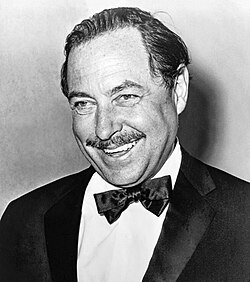Tennessee Williams Quote
Then what is good? The obsessive interest in human affairs, plus a certain amount of compassion and moral conviction, that first made the experience of living something that must be translated into pigment or music or bodily movement or poetry or prose or anything that's dynamic and expressivee--that's what's good for you if you're at all serious in your aims. William Saroyan wrote a great play on this theme, that purity of heart is the one success worth having. "In the time of your life--live!" That time is short and it doesn't return again. It is slipping away while I write this and while you read it, the monosyllable of the clock is Loss, loss, loss, unless you devote your heart to its opposition.
Then what is good? The obsessive interest in human affairs, plus a certain amount of compassion and moral conviction, that first made the experience of living something that must be translated into pigment or music or bodily movement or poetry or prose or anything that's dynamic and expressivee--that's what's good for you if you're at all serious in your aims. William Saroyan wrote a great play on this theme, that purity of heart is the one success worth having. "In the time of your life--live!" That time is short and it doesn't return again. It is slipping away while I write this and while you read it, the monosyllable of the clock is Loss, loss, loss, unless you devote your heart to its opposition.
Related Quotes
About Tennessee Williams
At age 33, after years of obscurity, Williams suddenly became famous with the success of The Glass Menagerie (1944) in New York City. It was the first of a string of successes, including A Streetcar Named Desire (1947), Cat on a Hot Tin Roof (1955), Sweet Bird of Youth (1959), and The Night of the Iguana (1961). With his later work, Williams attempted a new style that did not appeal as widely to audiences. His drama A Streetcar Named Desire is often numbered on short lists of the finest American plays of the 20th century alongside Eugene O'Neill's Long Day's Journey into Night and Arthur Miller's Death of a Salesman.
Much of Williams's most acclaimed work has been adapted for the cinema. He also wrote short stories, poetry, essays, and a volume of memoirs. In 1979, four years before his death, Williams was inducted into the American Theater Hall of Fame.
